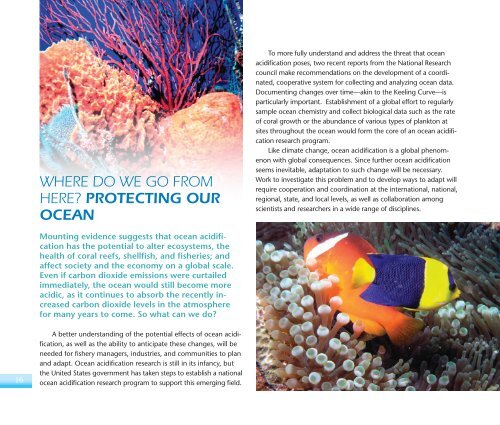OCEAN ACIDIFICATION Starting with the Science
SUMMARY DOCUMENT-Ocean Studies Board The National Academies—the National Academy of Sciences
SUMMARY DOCUMENT-Ocean Studies Board The National Academies—the National Academy of
Sciences
Create successful ePaper yourself
Turn your PDF publications into a flip-book with our unique Google optimized e-Paper software.
WHERE DO WE GO FROM<br />
HERE? PROTECTING OUR<br />
<strong>OCEAN</strong><br />
To more fully understand and address <strong>the</strong> threat that ocean<br />
acidification poses, two recent reports from <strong>the</strong> National Research<br />
council make recommendations on <strong>the</strong> development of a coordinated,<br />
cooperative system for collecting and analyzing ocean data.<br />
Documenting changes over time—akin to <strong>the</strong> Keeling Curve—is<br />
particularly important. Establishment of a global effort to regularly<br />
sample ocean chemistry and collect biological data such as <strong>the</strong> rate<br />
of coral growth or <strong>the</strong> abundance of various types of plankton at<br />
sites throughout <strong>the</strong> ocean would form <strong>the</strong> core of an ocean acidification<br />
research program.<br />
Like climate change, ocean acidification is a global phenomenon<br />
<strong>with</strong> global consequences. Since fur<strong>the</strong>r ocean acidification<br />
seems inevitable, adaptation to such change will be necessary.<br />
Work to investigate this problem and to develop ways to adapt will<br />
require cooperation and coordination at <strong>the</strong> international, national,<br />
regional, state, and local levels, as well as collaboration among<br />
scientists and researchers in a wide range of disciplines.<br />
Mounting evidence suggests that ocean acidification<br />
has <strong>the</strong> potential to alter ecosystems, <strong>the</strong><br />
health of coral reefs, shellfish, and fisheries; and<br />
affect society and <strong>the</strong> economy on a global scale.<br />
Even if carbon dioxide emissions were curtailed<br />
immediately, <strong>the</strong> ocean would still become more<br />
acidic, as it continues to absorb <strong>the</strong> recently increased<br />
carbon dioxide levels in <strong>the</strong> atmosphere<br />
for many years to come. So what can we do?<br />
16<br />
A better understanding of <strong>the</strong> potential effects of ocean acidification,<br />
as well as <strong>the</strong> ability to anticipate <strong>the</strong>se changes, will be<br />
needed for fishery managers, industries, and communities to plan<br />
and adapt. Ocean acidification research is still in its infancy, but<br />
<strong>the</strong> United States government has taken steps to establish a national<br />
ocean acidification research program to support this emerging field.


